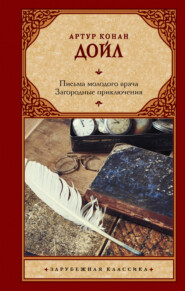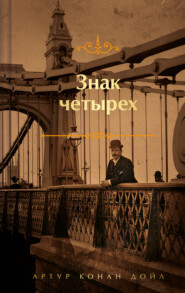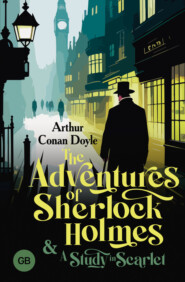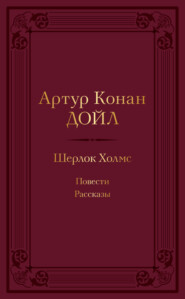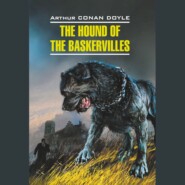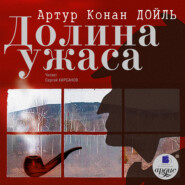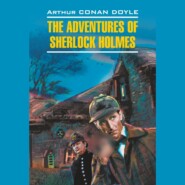По всем вопросам обращайтесь на: info@litportal.ru
(©) 2003-2024.
✖
The Green Flag, and Other Stories of War and Sport
Настройки чтения
Размер шрифта
Высота строк
Поля
English-speaking body-servant.
Anerley groaned at the disgrace of it. He had lost his head so completely that he had forgotten to cock his gun; and yet he knew that it was not fear but interest which had so absorbed him. He put his hand up to his head and felt that a wet handkerchief was bound round his forehead.
"Where are the two other dervishes?"
"They ran away. One got shot in arm."
"What's happened to me?"
"Effendi got cut on head. Effendi catch bad man by arms, and Scott effendi shot him. Face burn very bad."
Anerley became conscious suddenly that there was a pringling about his skin and an overpowering smell of burned hair under his nostrils. He put his hand to his moustache. It was gone. His eyebrows too? He could not find them. His head, no doubt, was very near to the dervish's when they were rolling upon the ground together, and this was the effect of the explosion of his own gun. Well, he would have time to grow some more hair before he saw Fleet Street again. But the cut, perhaps, was a more serious matter. Was it enough to prevent him getting to the telegraph-office at Sarras? The only way was to try and see. But there was only that poor little Syrian grey of his. There it stood in the evening sunshine, with a sunk head and a bent knee, as if its morning's work was still heavy upon it. What hope was there of being able to do thirty-five miles of heavy going upon that? It would be a strain upon the splendid ponies of his companions – and they were the swiftest and most enduring in the country. The most enduring? There was one creature more enduring, and that was a real trotting camel. If he had had one he might have got to the wires first after all, for Mortimer had said that over thirty miles they have the better of any horse. Yes, if he had only had a real trotting camel! And then like a flash came Mortimer's words, "It is the kind of beast that the dervishes ride when they make their lightning raids."
The beasts the dervishes ride! What had these dead dervishes ridden? In an instant he was clambering up the rocks, with Abbas protesting at his heels. Had the two fugitives carried away all the camels, or had they been content to save themselves? The brass gleam from a litter of empty Remington cases caught his eye, and showed where the enemy had been crouching. And then he could have shouted for joy, for there, in the hollow, some little distance off, rose the high, graceful white neck and the elegant head of such a camel as he had never set eyes upon before – a swanlike, beautiful creature, as far from the rough, clumsy baggles as the cart-horse is from the racer.
The beast was kneeling under the shelter of the rocks with its waterskin and bag of doora slung over its shoulders, and its forelegs tethered Arab fashion with a rope around the knees. Anerley threw his leg over the front pommel while Abbas slipped off the cord. Forward flew Anerley towards the creature's neck, then violently backwards, clawing madly at anything which might save him, and then, with a jerk which nearly snapped his loins, he was thrown forward again. But the camel was on its legs now, and the young pressman was safely seated upon one of the fliers of the desert. It was as gentle as it was swift, and it stood oscillating its long neck and gazing round with its large brown eyes, whilst Anerley coiled his legs round the peg and grasped the curved camel-stick which Abbas had handed up to him. There were two bridle-cords, one from the nostril and one from the neck, but he remembered that Scott had said that it was the servant's and not the house-bell which had to be pulled, so he kept his grasp upon the lower. Then he touched the long, vibrating neck with his stick, and in an instant Abbas' farewell seemed to come from far behind him, and the black rocks and yellow sand were dancing past on either side.
It was his first experience of a trotting camel, and at first the motion, although irregular and abrupt, was not unpleasant. Having no stirrup or fixed point of any kind, he could not rise to it, but he gripped as tightly as be could with his knee, and he tried to sway backwards and forwards as he had seen the Arabs do. It was a large, very concave Makloofa saddle, and he was conscious that he was bouncing about on it with as little power of adhesion as a billiard-ball upon a tea-tray. He gripped the two sides with his hands to hold himself steady. The creature had got into its long, swinging, stealthy trot, its sponge-like feet making no sound upon the hard sand. Anerley leaned back with his two hands gripping hard behind him, and he whooped the creature on. The sun had already sunk behind the line of black volcanic peaks, which look like huge slag-heaps at the mouth of a mine. The western sky had taken that lovely light green and pale pink tint which makes evening beautiful upon the Nile, and the old brown river itself, swirling down amongst the black rocks, caught some shimmer of the colours above. The glare, the heat, and the piping of the insects had all ceased together. In spite of his aching head, Anerley could have cried out for pure physical joy as the swift creature beneath him flew along with him through that cool, invigorating air, with the virile north wind soothing his pringling face.
He had looked at his watch, and now he made a swift calculation of times and distances. It was past six when he had left the camp. Over broken ground it was impossible that he could hope to do more than seven miles an hour – less on bad parts, more on the smooth. His recollection of the track was that there were few smooth and many bad. He would be lucky, then, if he reached Sarras anywhere from twelve to one. Then the messages took a good two hours to go through, for they had to be transcribed at Cairo. At the best he could only hope to have told his story in Fleet Street at two or three in the morning. It was possible that he might manage it, but the chances seemed enormously against him. About three the morning edition would be made up, and his chance gone for ever. The one thing clear was that only the first man at the wires would have any chance at all, and Anerley meant to be first if hard riding could do it. So he tapped away at the bird-like neck, and the creature's long, loose limbs went faster and faster at every tap. Where the rocky spurs ran down to the river, horses would have to go round, while camels might get across, so that Anerley felt that he was always gaining upon his companions.
But there was a price to be paid for the feeling. He had heard of men who had burst when on camel journeys, and he knew that the Arabs swathe their bodies tightly in broad cloth bandages when they prepare for a long march. It had seemed unnecessary and ridiculous when he first began to speed over the level track, but now, when he got on the rocky paths, he understood what it meant. Never for an instant was he at the same angle. Backwards, forwards he swung, with a tingling jar at the end of each sway, until he ached from his neck to his knees. It caught him across the shoulders, it caught him down the spine, it gripped him over the loins, it marked the lower line of his ribs with one heavy, dull throb. He clutched here and there with his hand to try and ease the strain upon his muscles. He drew up his knees, altered his seat, and set his teeth with a grim determination to go through with it should it kill him. His head was splitting, his flayed face smarting, and every joint in his body aching as if it were dislocated. But he forgot all that when, with the rising of the moon, he heard the clinking of horses' hoofs down upon the track by the river, and knew that, unseen by them, he had already got well abreast of his companions. But he was hardly halfway, and the time already eleven.
All day the needles had been ticking away without intermission in the little corrugated iron hut which served as a telegraph station at Sarras. With its bare walls and its packing-case seats, it was none the less for the moment one of the vital spots upon the earth's surface, and the crisp, importunate ticking might have come from the world-old clock of Destiny. Many august people had been at the other end of those wires, and had communed with the moist-faced military clerk. A French Premier had demanded a pledge, and an English marquis had passed on the request to the General in command, with a question as to how it would affect the situation. Cipher telegrams had nearly driven the clerk out of his wits, for of all crazy occupations the taking of a cipher message, when you are without the key to the cipher, is the worst. Much high diplomacy had been going on all day in the innermost chambers of European chancellories, and the results of it had been whispered into this little corrugated-iron hut. About two in the morning an enormous despatch had come at last to an end, and the weary operator had opened the door, and was lighting his pipe in the cool, fresh air, when he saw a camel plump down in the dust, and a man, who seemed to be in the last stage of drunkenness, come rolling towards him.
"What's the time?" he cried, in a voice which appeared to be the only sober thing about him.
It was on the clerk's lips to say that it was time that the questioner was in his bed, but it is not safe upon a campaign to be ironical at the expense of khaki-clad men. He contented himself, therefore, with the bald statement that it was after two. But no retort that he could have devised could have had a more crushing effect. The voice turned drunken also, and the man caught at the door-post to uphold him.
"Two o'clock! I'm done after all!" said he. His head was tied up in a bloody handkerchief, his face was crimson, and he stood with his legs crooked as if the pith had all gone out of his back. The clerk began to realise that something out of the ordinary was in the wind.
"How long does it take to get a wire to London?"
"About two hours."
"And it's two now. I could not get it there before four."
"Before three."
"Four."
"No, three."
"But you said two hours."
"Yes, but there's more than an hour's difference in longitude."
"By Heaven, I'll do it yet!" cried Anerley, and staggering to a packing-case, he began the dictation of his famous despatch.
And so it came about that the Gazette had a long column, with headlines like an epitaph, when the sheets of the Intelligence and the Courier were as blank as the faces of their editors. And so, too, it happened that when two weary men, upon two foundered horses, arrived about four in the morning at the Sarras post-office, they looked at each other in silence and departed noiselessly, with the conviction that there are some situations with which the English language is not capable of dealing.
The New Catacomb
"Look here, Burger," said Kennedy, "I do wish that you would confide in me."
The two famous students of Roman remains sat together in Kennedy's comfortable room overlooking the Corso. The night was cold, and they had both pulled up their chairs to the unsatisfactory Italian stove which threw out a zone of stuffiness rather than of warmth.
Outside under the bright winter stars lay the modern Rome, the long, double chain of the electric lamps, the brilliantly lighted cafes, the rushing carriages, and the dense throng upon the footpaths. But inside, in the sumptuous chamber of the rich young English archaeologist, there was only old Rome to be seen. Cracked and time-worn friezes hung upon the walls, grey old busts of senators and soldiers with their fighting heads and their hard, cruel faces peered out from the corners. On the centre table, amidst a litter of inscriptions, fragments, and ornaments, there stood the famous reconstruction by Kennedy of the Baths of Caracalla, which excited such interest and admiration when it was exhibited in Berlin.
Amphorae hung from the ceiling, and a litter of curiosities strewed the rich red Turkey carpet. And of them all there was not one which was not of the most unimpeachable authenticity, and of the utmost rarity and value; for Kennedy, though little more than thirty, had a European reputation in this particular branch of research, and was, moreover, provided with that long purse which either proves to be a fatal handicap to the student's energies, or, if his mind is still true to its purpose, gives him an enormous advantage in the race for fame. Kennedy had often been seduced by whim and pleasure from his studies, but his mind was an incisive one, capable of long and concentrated efforts which ended in sharp reactions of sensuous languor. His handsome face, with its high, white forehead, its aggressive nose, and its somewhat loose and sensuous mouth, was a fair index of the compromise between strength and weakness in his nature.
Of a very different type was his companion, Julius Burger. He came of a curious blend, a German father and an Italian mother, with the robust qualities of the North mingling strangely with the softer graces of the South. Blue Teutonic eyes lightened his sun-browned face, and above them rose a square, massive forehead, with a fringe of close yellow curls lying round it. His strong, firm jaw was clean-shaven, and his companion had frequently remarked how much it suggested those old Roman busts which peered out from the shadows in the corners of his chamber. Under its bluff German strength there lay always a suggestion of Italian subtlety, but the smile was so honest, and the eyes so frank, that one understood that this was only an indication of his ancestry, with no actual bearing upon his character.
In age and in reputation he was on the same level as his English companion, but his life and his work had both been far more arduous. Twelve years before he had come as a poor student to Rome, and had lived ever since upon some small endowment for research which had been awarded to him by the University of Bonn.
Painfully, slowly, and doggedly, with extraordinary tenacity and singlemindedness, he had climbed from rung to rung of the ladder of fame, until now he was a member of the Berlin Academy, and there was every reason to believe that he would shortly be promoted to the Chair of the greatest of German Universities. But the singleness of purpose which had brought him to the same high level as the rich and brilliant Englishman, had caused him in everything outside their work to stand infinitely below him. He had never found a pause in his studies in which to cultivate the social graces. It was only when he spoke of his own subject that his face was filled with life and soul. At other times he was silent and embarrassed, too conscious of his own limitations in larger subjects, and impatient of that small talk which is the conventional refuge of those who have no thoughts to express.
And yet for some years there had been an acquaintanceship which appeared to be slowly ripening into a friendship between these two very different rivals. The base and origin of this lay in the fact that in their own studies each was the only one of the younger men who had knowledge and enthusiasm enough to properly appreciate the other. Their common interests and pursuits had brought them together, and each had been attracted by the other's knowledge. And then gradually something had been added to this. Kennedy had been amused by the frankness and simplicity of his rival, while Burger in turn had been fascinated by the brilliancy and vivacity which had made Kennedy such a favourite in Roman society. I say "had," because just at the moment the young Englishman was somewhat under a cloud.
A love affair, the details of which had never quite come out, had indicated a heartlessness and callousness upon his part which shocked many of his friends. But in the bachelor circles of students and artists in which he preferred to move there is no very rigid code of honour in such matters, and though a head might be shaken or a pair of shoulders shrugged over the flight of two and the return of one, the general sentiment was probably one of curiosity and perhaps of envy rather than of reprobation.
"Look here, Burger," said Kennedy, looking hard at the placid face of his companion, "I do wish that you would confide in me."
As he spoke he waved his hand in the direction of a rug which lay upon the floor.
On the rug stood a long, shallow fruit-basket of the light wicker-work which is used in the Campagna, and this was heaped with a litter of objects, inscribed tiles, broken inscriptions, cracked mosaics, torn papyri, rusty metal ornaments, which to the uninitiated might have seemed to have come straight from a dustman's bin, but which a specialist would have speedily recognized as unique of their kind.
The pile of odds and ends in the flat wicker-work basket supplied exactly one of those missing links of social development which are of such interest to the student. It was the German who had brought them in, and the Englishman's eyes were hungry as he looked at them.
"I won't interfere with your treasure-trove, but I should very much like to hear about it," he continued, while Burger very deliberately lit a cigar. "It is evidently a discovery of the first importance. These inscriptions will make a sensation throughout Europe."
"For every one here there are a million there!" said the German. "There are so many that a dozen savants might spend a lifetime over them, and build up a reputation as solid as the Castle of St. Angelo."
Kennedy was thinking with his fine forehead wrinkled and his fingers playing with his long, fair moustache.
"You have given yourself away, Burger!" said he at last. "Your words can only apply to one thing. You have discovered a new catacomb."
"I had no doubt that you had already come to that conclusion from an examination of these objects."
"Well, they certainly appeared to indicate it, but your last remarks make it certain. There is no place except a catacomb which could contain so vast a store of relics as you describe."
"Quite so. There is no mystery about that. I have discovered a new catacomb."
"Where?"
"Ah, that is my secret, my dear Kennedy! Suffice it that it is so situated that there is not one chance in a million of anyone else coming upon it. Its date is different from that of any known catacomb, and it has been reserved for the burial of the highest Christians, so that the remains and the relics are quite different from anything which has ever been seen before. If I was not aware of your knowledge and of your energy, my friend, I would not hesitate, under the pledge of secrecy, to tell you everything about it. But as it is I think that I must certainly prepare my own report of the matter before I expose myself to such formidable competition."
Kennedy loved his subject with a love which was almost a mania – a love which held him true to it, amidst all the distractions which come to a wealthy and dissipated young man. He had ambition, but his ambition was secondary to his mere abstract joy and interest in everything which concerned the old life and history of the city. He yearned to see this new underworld which his companion had discovered.






